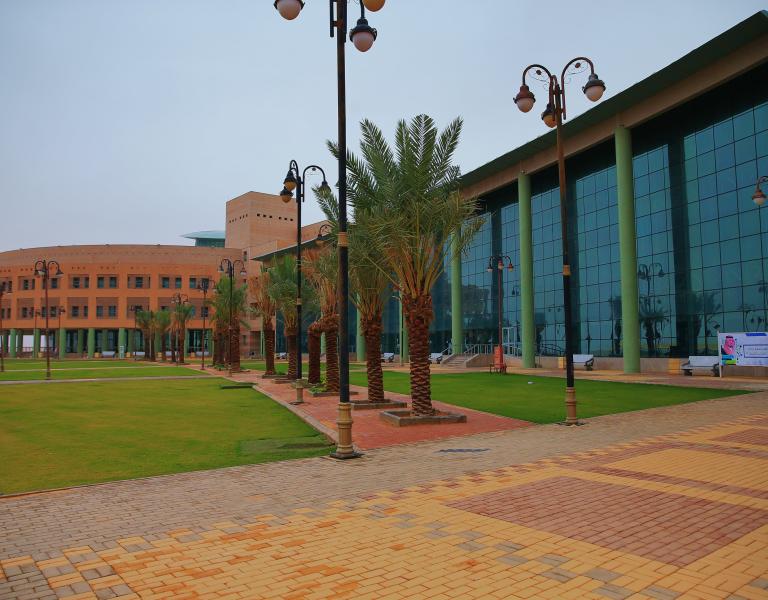About the Department:
The Information Technology program (IT) is a sole program conducted under the authority of the Information Technology Department in the Faculty of Computing and Information Technology (FCIT), Northern Borders University (NBU). The program offers a Bachelor of Science in Information Technology to male and female undergraduates in four years (quarter system). The program has certified 479 graduates (215 males and 264 females). The number of students registering in the program currently is 307 students. The current teaching staff serving the program are 9 assistant professors and 7 lecturers. The program has no tracks currently and is working on a development process to include the appropriate tracks to the IT field.
The program graduates contribute to the rising demands of qualified professionals to vision 2030 and jobs in the field. Providing qualified professionals to support their community, region and the kingdom. Students might choose the Information Technology program for different reasons. One of which is that the field of information Technology is trending nowadays. Information Security, Networks, Application Development and Internet Applications are one of the featured fields in the 2030 Vision. In addition, graduates of the program can find jobs in a variety of professional occupations, such as: IT Manager, IT Sales Specialist, Project Manager, Software Developer and Information Security Analyst.
The mission and goals of the Information Technology program are focused on preparing specialists in the field of information technology who are able to maintain and manage the digital information of businesses and organizations. Furthermore, the program is focused on preparing graduates who are ethical, professional and are capable of implementing appropriate solutions using the necessary technologies, scientific research, and innovation technologies, through their knowledge of information technology.
The program has gone a long way since the first academic year 2007-2008. The Department of Information Technology has witnessed remarkable development at all levels: academically and in terms of infrastructure, such as the 17 laboratories, which have just been updated with the latest equipment and classrooms. This achievement enabled the department to increase the number of accepted students. Moreover, the faculty of the Information Technology department has made a tremendous effort to meet the requirements of the international Accreditation Board for Engineering and Technology (ABET). The achievement of gaining the ABET accreditation (2018-2024) resulted in improving the learning outcomes of the program’s graduates over the past 4 years. For example, the program has achieved the best performance of apparent completion as a result of meeting the global standard for education. We expect to improve the quality and outcomes of the program even further after fulfilling the requirements of NCAAA.
Brief about the program:
Students at Northern Border University (NBU) are eligible for a bachelor’s degree in information technology after completion of 136 credit hours in four years (quarter system). This includes Graduation Project that is equivalent to 4 credit hours. The minimum cumulative grade point average for graduation is 2.75.
Program Educational Objectives:
The graduates of the bachelor’s in Information Technology program are expected to:
- Have excelled in core information technology knowledge area of their choice.
- Apply the acquired knowledge to solve problems requiring IT based solutions using latest tools and techniques.
- Understand and respect professional, ethical and social values in the field of IT.
- Possess strong communication and problem solving skills and have the ability to work in teams.
- Be aware of research directions, modern innovations and entrepreneurship prospects related to IT areas.
Program Learning Outcomes (PLOs):
Knowledge PLOs:
K1: Define and explain the fundamentals of computing and mathematics appropriate to the discipline.
K2: Recognize the best practices and standards and describe their applications.
Skills PLOs:
S1: Analyze a problem and identify the computing requirements appropriate to its solution while being aware of the impact of that solution on individuals, organizations, and society.
S2: Design, implement, and evaluate a computing-based solution to meet a given set of requirements in the context of the program’s discipline.
S3: Use current techniques, skills, and tools necessary for computing practices.
S4: Communicate effectively in a variety of professional contexts.
S5: Apply current technical concepts and practices in the core information technologies and Integrate IT-based solutions into the user environment.
S6: Analyze user needs and take them into account in the selection, creation, evaluation, and administration of computer-based systems by creating and following an effective project plan.
Values PLOs:
V1: Recognize professional, ethical, legal, security and social issues and responsibilities.
V2: Function effectively in teams to accomplish a common goal.
V3: Recognize and explore recent technology as needed, using appropriate lifelong learning strategies.
Student Outcomes (SOs):
- Analyze a complex computing problem and to apply principles of computing and other relevant disciplines to identify solutions.
- Design, implement, and evaluate a computing-based solution to meet a given set of computing requirements in the context of the program’s discipline.
- Communicate effectively in a variety of professional contexts.
- Recognize professional responsibilities and make informed judgments in computing practice based on legal and ethical principles.
- Function effectively as a member or leader of a team engaged in activities appropriate to the program’s discipline.
- Use systemic approaches to select, develop, apply, integrate, and administer secure computing technologies to accomplish user goals.
- Define and explain fundamentals of computing and mathematics appropriate to the discipline.
- Recognize the best practices and standards, and describe their applications.
- Use current techniques, skills, and tools necessary for Computing practices.
- Recognize and explore recent technology as needed, using appropriate lifelong learning strategies.
- Apply current technical concepts and practices in the core information technologies and Integrate IT-based solutions into the user environment.
International Accreditation:
The Information Technology program is accredited by the International Accreditation Commission ABET (2016 - 2024)

